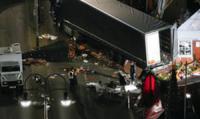-
How governments and companies can prevent the next insider attack
Insider threats could take many forms, such as the next Edward Snowden, who leaked hundreds of thousands of secret documents to the press, or the next Nidal Hasan, the Fort Hood mass killer. Indeed, in today’s high-tech and hyperconnected world, threats from insiders go far beyond leakers and lone-wolf shooters. A single insider might be able to help adversaries steal nuclear material that terrorists could use to make a crude nuclear bomb, install malware that could compromise millions of accounts or sabotage a toxic chemical facility to cause thousands of deaths. How can we better protect against the enemy within, no matter what it is that needs to be protected? In our high-tech society, the insider threat is ever-present. High-security organizations, governments and companies alike need to take action to counter the organizational and cognitive biases that often blind us to the insider danger – or future blunders will condemn us to more disasters.
-
-
Terrorists could kill 30 million people within a year using bioweapons: Bill Gates
Bill Gates, in a speech at the Munich Security Conference, compared the dangers to nuclear war and bioterrorism. “The next epidemic could originate on the computer screen of a terrorist intent on using genetic engineering to create a synthetic version of the smallpox virus, or a super contagious and deadly strain of the flu,” he said. “Whether it occurs by a quirk of nature or at the hand of a terrorist, epidemiologists say a fast-moving airborne pathogen could kill more than thirty million people in less than a year.”
-
-
Lebanese media: Hezbollah given “game-changing” Iranian arms, has tunnels on Israeli border
Iran has sent “game-changing” weapons to its proxy group Hezbollah, which has been actively building tunnels and fortifications along Lebanon’s border with Israel, a knowledgeable observer said. “Israel reads the map and realizes that Hizbullah’s weapons arsenal has steadily grown, and is now several times larger than it was in 2006, and that the kind of weapons that the enemy tried and is still trying to prevent the resistance from acquiring – namely, what Israel calls ‘game-changing’ weapons – is available to it in great amounts,” he added.
-
-
January 2017 terrorism: The numbers

The House Homeland Security Committee has released its February 2017 Terror Threat Snapshot, which details terrorism events and trends in January 2017. The snapshot is a monthly committee assessment of the threat America, the West, and the world face from ISIS and other Islamist terrorists. The document is produced by the Majority Staff of the committee. It is based on information culled from open source materials, including media reports, publicly available government statements, and nongovernmental assessments.
-
-
Venezuelan vice-president is a major drug trafficker, with terrorism ties: U.S.
The Trump administration on Monday announced it had imposed sanctions on Venezuela’s vice-president, Tareck El Aissami, charging that he was a major drug trafficker. El Aissami is the most senior Venezuelan official – and one of the most senior Latin American official — to have been charged of drug offenses by the United States. El Aissami has caught the eye of U.S. law enforcement years ago, when, as interior minister in the government of Hugi Chavez, he ordered his underlings to issue dozens of fraudulent Venezuelan passports to people from the Middle East, including members of Hezbollah.
-
-
Hate groups increase for second consecutive year, while Patriot groups decline
The number of hate groups in the United States rose for a second year in a row in 2016, according to the SPLC annual census of hate groups and other extremist organizations, released yesterday. The most dramatic growth was the near-tripling of anti-Muslim hate groups — from 34 in 2015 to 101 last year. Figures compiled by the FBI dovetail with those of the SPLC – and the latest FBI statistics show that hate crimes against Muslims grew by 67 percent in 2015, the year in which Trump launched his campaign. In contrast to the growth of hate groups, antigovernment “Patriot” groups saw a 38 percent decline — plummeting from 998 groups in 2015 to 623 last year.
-
-
UN warns Lebanon against arming Hezbollah
The United Nations warned Lebanese President Michel Aoun against arming Hezbollah, a day after Aoun said that the Iran-backed terrorist organization was essential to Lebanon’s security. UN Council Resolution 1701, which was adopted unanimously to end the 2006 war between Israel and Hezbollah, called for the disarming of all militias in Lebanon and the re-establishment of the Lebanese government’s authority over the southern part of the country, and prohibited the transfer of arms to any entity other than the government in Lebanon. Hezbollah’s continued armed presence in southern Lebanon violates these three elements of the resolution.
-
-
Former Iranian hostage asks feds to seize New York skyscraper to pay for damages
A former hostage of the Iran-backed terror group Hezbollah has asked the federal government to seize a New York City skyscraper that he alleges is a front for the Iranian government in order to collect on his multi-million dollar court judgment against the Islamic Republic.
-
-
American ISIS fighters likely to be U.S. born, engaged in society: Study

A new, comprehensive study of individuals in the United States considered ISIS supporters, challenges widely held assumptions that ISIS supporters are uneducated, isolated, and unemployed, while finding almost no refugees among the group studied. One of the report’s authors said that for policymakers, the report shows shutting the U.S. borders to refugees and visitors from Islamic countries won’t prevent support for ISIS and could blind authorities to real threats. Officials need to understand ISIS’s propaganda strategy in the United States and target its methods for driving recruitment and radicalization, he added.
-
-
Trump's travel ban “recruiting tool for extremists”: James Clapper
James Clapper, who served as director of national intelligence under President Barack Obama, said he worried that the Travel Ban announced by the Trump administration is damaging to U.S. interests. Moreover, he said, it was unnecessary because he was not aware of any intelligence which would justify necessitating the ban. Clapper said the current vetting was not “perfect,” but that the safeguards were strong enough to keep the country safe without this new measure.
-
-
Trump loses appeal, but travel ban fight isn’t over yet
Thursday’s appellate court opinion, which denied President Donald Trump’s appeal concerning his immigrant ban executive order, was unsurprising. It cautiously declined to upset the status quo, temporarily continuing to prevent the executive order’s enforcement nationwide. But it also allowed for further briefing and argument. Ultimately, this is a clear defeat for the Trump Administration. But, given the necessarily preliminary nature of these emergency proceedings, it may not be a permanent one. Trump can continue to argue before this three-judge panel, appeal their decision to the full 29-judge-strong Ninth Circuit Court of Appeals, and, ultimately and predictably, move on to the Supreme Court. Given its fast-track nature, the case will likely reach the Supreme Court before the current vacancy is filled.
-
-
Paris to builds protective system around Eiffel Tower
France will spend €20 million ($22 million) to build a permanent protective barrier around the Eiffel Tower, which will replace temporary defensive system put around the iconic tower in the fake of a spate of terrorist attacks in France. “Sadly, the risk of terrorism hasn’t gone away,” deputy mayor Jean-François Martins said at a Paris press conference. “It’s not a wall, it’s an aesthetic perimeter.”
-
-
Where did the idea of an ‘Islamic bomb’ come from?
The heavily freighted idea of an “Islamic bomb” has been around for some decades now. The notion behind it is that a nuclear weapon developed by an “Islamic” nation would automatically become the Islamic world’s shared property – and more than that, a “nuclear sword” with which to wage jihad. But as with many terms applied to the “Islamic world”, it says more about Western attitudes than about why and how nuclear technology has spread. It’s true that prominent Muslim figures spoke rhetorically about a “bomb for the ummah”. But this was never more than rhetoric. Leaving aside all nuclear matters, internecine and sectarian differences and conflict mean that global Islamic political unity is unlikely in the extreme. The Islamic bomb has always been a convenient device with which to elide complex problems of religion, politics, and nuclear weapons. And sadly, it still is. Those who still casually bandy the term about would do well to think about where it really comes from.
-
-
Child from Pittsburgh admits to hack attempt of Brussels Airport after ISIS attacks
A Pittsburgh child has admitted to launching a cyberattack against Brussels Airport in the aftermath of the 22 Mach 2016 suicide bombing by Belgian ISIS followers, which killed more than thirty people. The Belgian federal public prosecutor’s office said the suspect aimed to take down the website of the airport operator – the Brussels Airport Company — and “infiltrate the computer system,” but was unsuccessful.
-
-
Israel prepares for possible Hezbollah naval commando attack
The Israel Defense Forces (IDF) is preparing for a possible Hezbollah incursion using marines and other naval commandos in the country’s north. A group of commandos could try to infiltrate north of Nahariya while protected by mortar and anti-tank fire from Lebanon, the IDF believes. It also believes that Hezbollah will attempt to capture Israeli territory and hold it, even temporarily, in order to declare a victory against Israel.
-